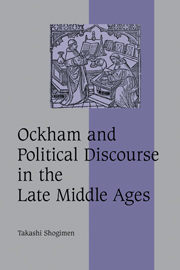Book contents
- Frontmatter
- Contents
- Preface
- List of abbreviations
- INTRODUCTION
- 1 THE POVERTY CONTROVERSY
- 2 A GENERAL THEORY OF HERESY
- 3 THE PROBLEM OF PAPAL HERESY
- 4 PAPAL PLENITUDO POTESTATIS
- 5 PETRINE PRIMACY
- 6 THE DEFENCE OF HUMAN FREEDOM
- Appendix: Ockham's ‘Dialogus’ and Marsilius' ‘Defensor pacis’
- Bibliography
- Index
- Cambridge Studies in Medieval Life and Thought Fourth series
5 - PETRINE PRIMACY
Published online by Cambridge University Press: 23 July 2009
- Frontmatter
- Contents
- Preface
- List of abbreviations
- INTRODUCTION
- 1 THE POVERTY CONTROVERSY
- 2 A GENERAL THEORY OF HERESY
- 3 THE PROBLEM OF PAPAL HERESY
- 4 PAPAL PLENITUDO POTESTATIS
- 5 PETRINE PRIMACY
- 6 THE DEFENCE OF HUMAN FREEDOM
- Appendix: Ockham's ‘Dialogus’ and Marsilius' ‘Defensor pacis’
- Bibliography
- Index
- Cambridge Studies in Medieval Life and Thought Fourth series
Summary
We saw in the previous chapter that for Ockham papal monarchy is only expedient, not necessary, for the community of believers. His reinterpretation of the canonist maxim ‘necessity has no law’ reinforces the possibility of constitutional change from regal to aristocratic rulership in the Church. The monarchic rulership of one pope may be replaced by aristocratic rulership by more-than-one in cases of necessity. Despite this, Ockham does not reject the primacy of St Peter. He has recourse to Aristotelian political science in order to conceptualise constitutional change in the Church, while he defends St Peter's supremacy from a possible Aristotelian objection. After stating that Peter was inferior to John in terms of merit and to Paul in terms of wisdom, Ockham's Disciple raises an objection to Petrine primacy on the basis of the Aristotelian principle that government by a single ruler is not expedient if there are others equal to him in wisdom and virtue. Ockham's Master argues that this objection cannot stand if the people wish to obey one ruler due to their humility or their love for the res publica or common utility. When Ockham wrote this, he probably had in mind a vision of the early Church: ‘Knowing Christ's decree, however, the apostles were very ready out of humility and obedience to obey Peter for the whole of his life.’ But how did Ockham come to hold this view? What was its biblical foundation?
- Type
- Chapter
- Information
- Ockham and Political Discourse in the Late Middle Ages , pp. 185 - 231Publisher: Cambridge University PressPrint publication year: 2007

